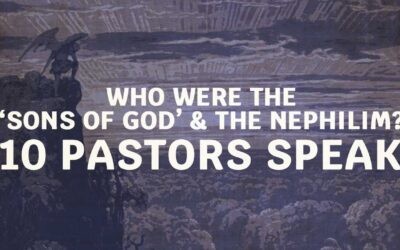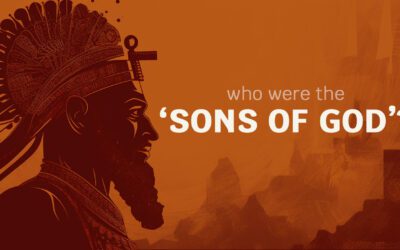The following attempts to create a unified and consistent perspective on the many questions and factors involved in discussing the Nephilim and the ‘sons of God’ in Genesis and the Book of Enoch.
Such a proposal is only possible by first taking certain worldview assumptions for granted. The authors of this site believe the Bible is God’s written message to mankind, as such, our starting assumptions may be widely different from yours.
In Short:
Originally, Genesis 6 most likely describes an event involving angels and earthly women that resulted in offspring whose deeds were widely remembered and retold by almost all early cultures, forming a portion of the basis of popular mythology that lasts to today.
To take back control of the story, Jewish writers tried to ‘redeem’ the pagan myths inspired by this original event around the time of the Babylonian exile, resulting in the Book of Enoch and others.
By the time of Christ, the angelic interpretation and the elaborations on the story made by pseudepigraphical authors was the widely known and accepted narrative for the Jews and early Christians.
This lasted until around 300 AD, when church leaders like Augustine popularized less supernatural interpretations, influenced by the following factors:
- doubt that such a thing could actually happen
- avoidance to the implications and questions such an event would generate
- distrust of popular 2nd temple literature expounding on the event
Due to their influence in the church, the story remained largely ignored until recent times, when a variety of influences and factors led to a renewal of interest in exploring the story and its interpretations.
This has resulted in a growing amount of quality research on the topic, as well as a plethora of misinformation.
Explained in More Detail:
Who were the ‘sons of God’ in Genesis?
Although other interpretations may have some validity, the weight of evidence behind the supernatural theory for the identity of the sons of God seems to be the strongest way to interpret Genesis 6:1-4.
The weight of evidence coming from
- The text of the passage itself and other OT usages
- Parallel stories in other cultures around that time also indicate a supernatural origin
- This interpretation is largely unchallenged in ancient Christian and Jewish thought
- The frequent referencing by New Testament authors and early church fathers.
All this evidence points to the supernatural identity of the sons of God is the most likely.
What about the Book of Enoch & ancient myths?
The story of the Nephilim in the Book of Genesis is incredibly brief and doesn’t provide any significant details for us to better understand how it happened and what the consequences were.
This is not the case with sources such as the Book of Enoch, which elaborates on the story in great detail, but there are few who argue that Enoch should be trusted as an authentic retelling.
So how should we view these sources in relation to each other and to the original event?
It seems that this story was remembered and retold widely during the time between Babel and Abraham. The fact that many cultures share a story of a rebellion against the ‘old gods’ by the ‘earthborn young gods’ would support this claim.
But as the Jewish nation formed, they were content with the short reference in Genesis, not bothering to elaborate on it as far as we can tell. However, their neighboring cultures continued to develop and construe the story as the origin of their own gods.
Over time, the divine sons of the Creator and their semi-divine offspring became the subject of worship or veneration through epic tales, forming the basis of very early myths such as The Epic of Gilgamesh ( c. 2100–1200 BC), the Enuma Elish (pre-1000 BC), and Hesiod’s Theogony (c. 700 BC).
Around the time of the Babylonian exile and Second Temple period, Jewish writers sought to “redeem” these pagan aberrations, take control of the narrative, and tell an alternative epic tale ‘correcting’ the mistakes of the widely popular mythologies that had formed the basis of the idolatry around them, as was commonly done at the time.
This seems the most likely and realistic way to understand why books such as ‘the Book of Enoch’ exist, and understand their relationship to the original event itself. These books most likely contain little (if any) original facts about the event that the Bible does not share. Their value lies in providing a window into Jewish religious thought and concerns during the time when they were most likely written.
The Apostles & Early Church Fathers
Thus, when we come to the New Testament writers and early church fathers, who referenced this event using the same terminology that the Book of Enoch (and others) use, this tells us that they considered the event to have been an illicit incursion by angels.
They didn’t challenge or condemn the common understanding of the event, nor the elaborations made by the Book of Enoch.
Why did the story get suppressed?
It wasn’t until the time of Augustine that the angelic interpretation became unpopular. And many books such as Enoch fell out of favor because they were rightly considered pseudepigraphical.
Why the renewed interest in the Nephilim topic?
The Ethiopian church retained the Book of Enoch as part of their scriptures, which led to the book’s rediscovery in 1773 by James Bruce. It wasn’t until the discovery of the Book of Enoch among the Dead Sea Scrolls did confirmation come for the antiquity of the book (300 BC at least).
With archaeological finds such as this and increasing public interest in alternative history like Ancient Aliens, more availability of scholarship and cataloging of ancient texts that retell this story, the public has become more aware of it.
Pastors and laymen are required to confront these questions more and more frequently. Thus the need for a resource to assist in answering these questions and discerning fact from fantasy.
Conclusion:
This view of the topic does not answer every question that we have, and just about everyone will have a different opinion on some aspect.
A lot has been written by very good scholars that would dispute and/or support the ideas presented in this unifying theory. And more research and thought is going to have to be done to improve upon it or throw it out altogether.
However, we need to strive for consistency and evidence-based conclusions. After 25+ years of research and reading countless contradictory ideas on this subject, I believe this perspective gives us the framework in which to know how to judge various sources in a fair way, and some grounding so we do not continuously tumble down rabbit holes and poorly supported assertions that some insist on.
Not all sources related to this topic should be taken with the same weight. We need to remember when and why some of these things were written. This perspective allows us to appreciate the Book of Enoch and other such sources for what they are, and not ascribe to them what they are not.



